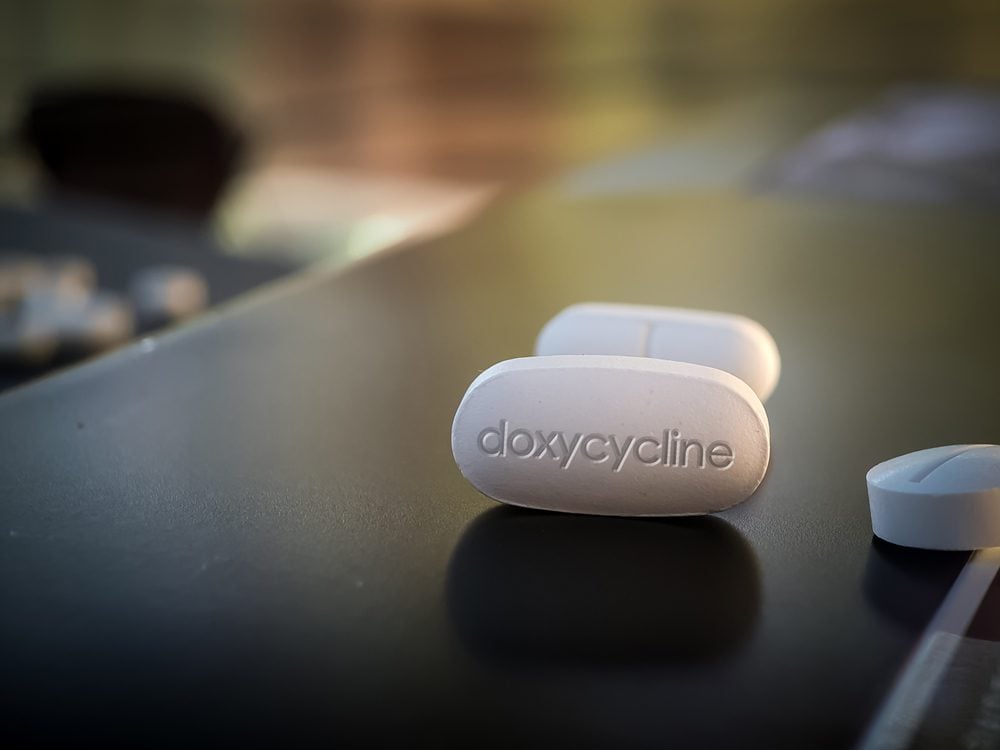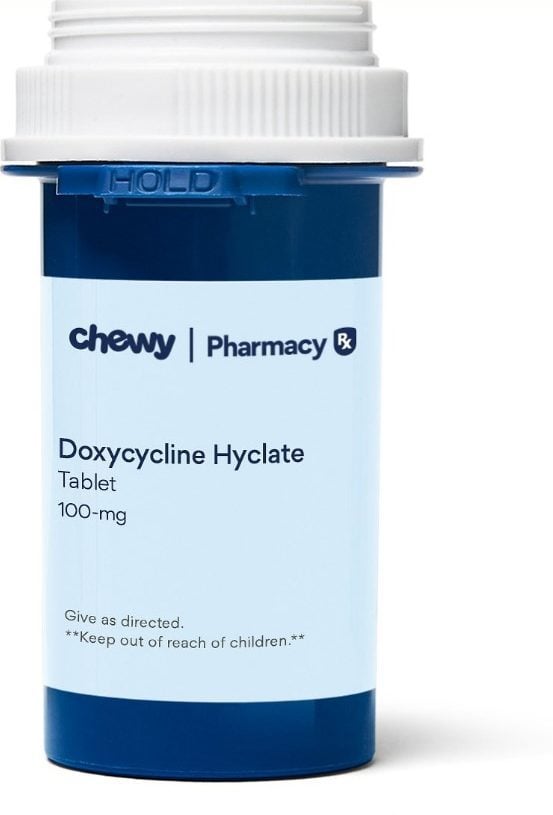Antibiotics 101: A Guide to Doxycycline for Dogs

Table of Contents
Doxycycline (brand names Vibramycin®, Periostat®, Doryx®, Acticlate®, Oracea®, Monodox®) for dogs is a broad-spectrum antibiotic from the class of tetracycline antibiotics.
In veterinary medicine, Doxycycline is used to treat infections caused by various bacteria and microbes. The antibiotic works by inhibiting protein synthesis and changing the permeability of the cytoplasmatic membranes.
Doxycycline is perfectly safe for dogs when prescribed by a veterinarian and used following the vet’s instructions (dose, frequency, and length of administration).
What is Doxycycline Used to Treat in Dogs?

Doxycycline is used to treat bacterial and certain microbe infections. The antibiotic is not efficient against viral and fungal infections. Let’s take a closer look at the different uses of Doxycycline in dogs.
Doxycycline for Tick-Borne Diseases in Dogs. There are many tick-borne diseases in dogs, including Rocky Mountain spotted fever (Rickettsia rickettsii), Lyme disease (Borrelia burgdorferi), and ehrlichiosis (Ehrlichia Canis).
Doxycycline for Leptospirosis in Dogs. Leptospirosis is a potentially life-threatening condition. Luckily, it is treatable when caught early. It can be treated with penicillins in the early stages, but once progressed, it requires tetracycline antibiotics.
Doxycycline for Heartworm Disease in Dogs. Doxycycline is an integral part of heartworm treatment. The antibiotic does not act directly against the Dirofilaria immitis parasite. Instead, it destroys the symbiotic Wolbachia bacteria, which supports the adult worms.
Doxycycline for Urinary Tract Infections in Dogs. Doxycycline is the antibiotic of choice for dogs with urinary tract infections (UTIs). This is because most UTIs in dogs are caused by E. coli, and the bacteria is sensitive to Doxycycline.
Doxycycline for Dog Periodontal Disease. Dogs, especially certain breeds, are prone to gum and teeth infections. Doxycycline can be used in the treatment of such infections or preventively after dental procedures like extractions and scaling.
Doxycycline for Dog Respiratory Infections. Doxycycline is used in the treatment of respiratory infections, both in the upper and lower respiratory organs. Doxycycline is the go-to antibiotic for dogs with kennel cough.
Doxycycline for Canine Parvovirus. Dogs with parvovirus are often prescribed Doxycycline. The antibiotic does not target the viral causative agent, but it prevents complications in the form of secondary bacterial infections.
What are the Side Effects of Doxycycline in dogs?
The most common side effects of Doxycycline are vomiting, diarrhea, loss of appetite, weight loss, and drowsiness. In addition to these adverse GI effects, on rare occasions, Doxycycline may cause more severe side effects such as:
- Jaundice (due to liver failure)
- Trouble swallowing
- Seizures
- Bleeding
- Behavioral changes.
Interestingly, Doxycycline increases the skin’s sunlight sensitivity making it more susceptible to sunburns, especially on hairless areas like the nose, ears, and eyelids.
Plus, it can impair normal growth and cause teeth discoloration hence it cannot be used in growing puppies, pregnant, and lactating females.
Obviously, Doxycycline must not be used in dogs allergic to tetracycline antibiotics, and its use requires extra caution in pets with impaired kidney and liver function.
Doxycycline Dosage for Dogs

The recommended Doxycycline dose for dogs is between 2.2 and 4.5 mg per pound of body weight (5 to 10 mg per kg). The exact dose and length of treatment depend on the underlying condition.
For example, for dogs with gum disease and infection, Doxycycline use is limited to 5 to 7 days. However, the treatment may last for 30 or 45 days in dogs with respiratory infections or tick-borne diseases.
In case you forget dosing your dog, you have two options – give the missed dose as soon as you remember or skip it entirely and give the next dose as scheduled.
Doxycycline for Dogs Usage Guidelines

Doxycycline is a fast-acting medication that starts working in as little as 1 to 2 hours in dogs. However, it usually takes a couple of days before any visible improvements. It is available in the form of tablets, capsules, and liquids. There is also injectable Doxycycline, but it stings a lot and is not suited for long-term use.
When dosing your dog with Doxycycline, you can reduce the risk of GI side effects and upset stomach by mixing it with food (just not dairy or iron-rich foods as calcium and iron decrease the Doxycycline’s efficacy).
If using tablets without food, make sure your dog drinks at least 6 ml of water immediately after swallowing the drug. This is because Doxycycline tablets can easily get lodged in the esophagus and cause ulcers.
Finally, a word to two on proper storage. Always keep the Doxycycline in an air-tight container, at room temperature, away from light, and out of your dog’s reach. Oral suspensions must be discarded 14 days after the bottle is opened.
Doxycycline Drug Interactions
Doxycycline may interact with certain medications to boost or inhibit their effects. Therefore, extra caution is warranted when using Doxycycline in conjunction with the following medications:
- Oral antacids (pectin, kaolin, bismuth)
- Anticoagulant meds (warfarin)
- Barbiturates (phenobarbital)
- Certain antibiotics (penicillin, enrofloxacin)
- Anti-parasitic meds (ivermectin)
- Iron and calcium supplements
Before starting your dog on Doxycycline (or any other medication), inform the vet about any dietary supplements, vitamins, or herbal remedies your dog is taking.
Doxycycline Alternatives for Dogs

There are many natural antibiotics for dogs like garlic, honey, ginger, goldenseal, echinacea, clove, and oregano. However, some of these are dangerous for dogs, while others are not directly harmful but may trigger side effects if used in amounts necessary to achieve antimicrobial results. All in all, there are no foolproof natural alternatives to Doxycycline for dogs.
Also, do not hesitate to consult with your trusted veterinarian if you have any concerns about the use of Doxycycline. The information in this article is purely educational.
















